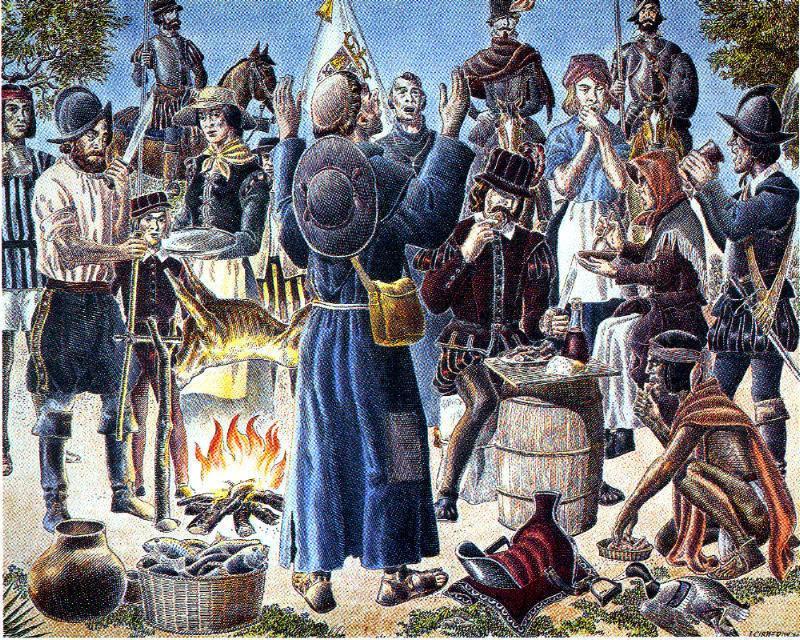by Michael Hendrix
Each year as we celebrate Thanksgiving in the United States, we remember the remarkable story of how the Pilgrims celebrated the feast of Thanksgiving in 1621 after surviving harsh obstacles in their settlement in Plymouth. While the events are certainly worthy of remembering and commemorating, it may come as a surprise that the first acts of thanksgiving celebrated by settlers and Native Americans were actually not by the Pilgrims, but by Spanish settlers, many of whom were B’nai Anusim. B’nai Anusim is a Hebrew term that refers to the descendants of Jews who had been forced to convert to Catholicism during the Spanish Inquisition. While B’nai Anusim continued to profess the Catholic faith outwardly, many privately maintained their Jewish faith and customs. Although these actions of thanksgiving by Spanish B’nai Anusim settlers preceded the famed Plymouth thanksgiving they have been tragically overlooked by history and the American public.
 |
The first of these thanksgivings took place in St. Augustine, Florida, which is the oldest settlement in the United States that was established by European settlers. In 1565 Spain commissioned Pedro Menéndez de Avilés to explore and colonize Florida. His crew sighted land on August 28t but remained on the ship until September 8th when they went ashore with flying banners and the sounding of trumpets. The Naval commander of Menéndez’s voyage was his Anusim brother-in-law Gonzalo Solis de Meras. A number of his crew were also B’nai Anusim. It is suspected that the Anusim crew waited until Yom Kippur passed before they went ashore. When the Spanish colonists finally came ashore they were greeted peacefully by members of the native Timucua tribe. Upon arriving the crew held a service of Thanksgiving giving thanks for their safe travel to their new homeland. After the service they celebrated with a feast along with the Timucuas who received them, making it the first community thanksgiving in the United States.
Another important Anusim Thanksgiving took place in Texas in 1598 on an expedition that would have a lasting impact on the settlement of the southwestern United States. After the hideous torture and execution of the Anusim Carvajal family in Mexico, Juan de Oñate received permission to explore and settle present-day New Mexico. His crew of over 500 B’nai Anusim men, women and children left Santa Barbara, Mexico in November of 1597. After wandering through the barren Chihuahua desert for months, including the last four days without water, the expedition finally reached the Rio Grande near present-day San Elizario, Texas, where they found an abundance of water and plenty of wild game along the river. Grateful for their survival of the perilous journey, the Anusim settlers set out to prepare a grand celebration, along with the local Indians who warmly received them. Oñate, the leader of the expedition, declared the day to be a day of thanksgiving and celebration, with the Indians supplying fish and the Spanish supplying game. Gaspar Perez de Villagra, chronicled the journey in his book “Historia de Nuevo Mexico” (History of New Mexico), which was published in 1610. He described the Thanksgiving celebration as a “happy and joyous occasion.”
After their thanksgiving celebration, Juan de Oñate and his crew continued their expedition into New Mexico where they established settlements at Santo Domingo (near present-day Albuquerque), Santa Fe, and San Gabriel.
These settlements, and others, established by Anusim settlers had a powerful and lasting impact on the settlement of the United States. As we pause to remember those who went before us on this Thanksgiving, let us remember the profound, yet often overlooked, part that B’nai Anusim have had in the founding and settlement of the United States.
Related article: The Secrets of Spanish Florida from the University of Florida.







